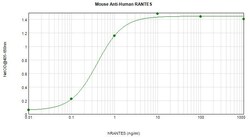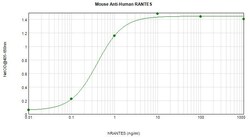500-M75-500UG
antibody from Invitrogen Antibodies
Targeting: CCL5
D17S136E, MGC17164, RANTES, SCYA5, SISd, TCP228
Antibody data
- Antibody Data
- Antigen structure
- References [11]
- Comments [0]
- Validations
- ELISA [2]
Submit
Validation data
Reference
Comment
Report error
- Product number
- 500-M75-500UG - Provider product page

- Provider
- Invitrogen Antibodies
- Product name
- CCL5 (RANTES) Monoclonal Antibody, PeproTech®
- Antibody type
- Monoclonal
- Antigen
- Recombinant full-length protein
- Description
- AA Sequence of recombinant protein: SPYSSDTTPC CFAYIARPLP RAHIKEYFYT SGKCSNPAVV FVTRKNRQVC ANPEKKWVRE YINSLEMS. Preparation: Produced in BALB/c mice immunized with highly pure Recombinant Human RANTES (CCL5). Anti-Human RANTES (CCL5)-specific antibody was purified from ascites fluid by Protein A affinity chromatography. Sandwich ELISA: Assuming 100 µL/well, a concentration of 2.0-4.0 µg/mL of this antibody will detect at least 500 pg/mL of Recombinant Human RANTES (CCL5) when used with PeproTech Biotinylated Antigen Affinity Purified Anti-Human RANTES (CCL5) (500-P36BT) as the detection antibody at a concentration of approximately 0.5-1.0 µg/mL. Western Blot: To detect Human RANTES (CCL5) by Western Blot analysis this antibody can be used at a concentration of 0.5-1.0 µg/mL. When used in conjunction with compatible secondary reagents the detection limit for Recombinant Human RANTES (CCL5) is 0.25-2.0 ng/lane, under reducing conditions and 0.25-0.5 ng/lane, under non-reducing conditions.
- Reactivity
- Human
- Host
- Mouse
- Vial size
- 500 μg
- Concentration
- 1 mg/mL
- Storage
- -20°C
Submitted references Tumor Cell-Autonomous Pro-Metastatic Activities of PD-L1 in Human Breast Cancer Are Mediated by PD-L1-S283 and Chemokine Axes.
Notch-Mediated Tumor-Stroma-Inflammation Networks Promote Invasive Properties and CXCL8 Expression in Triple-Negative Breast Cancer.
Tumor-Stroma-Inflammation Networks Promote Pro-metastatic Chemokines and Aggressiveness Characteristics in Triple-Negative Breast Cancer.
Lactate-activated macrophages induced aerobic glycolysis and epithelial-mesenchymal transition in breast cancer by regulation of CCL5-CCR5 axis: a positive metabolic feedback loop.
Regulation of the inflammatory profile of stromal cells in human breast cancer: prominent roles for TNF-α and the NF-κB pathway.
Tumor-promoting circuits that regulate a cancer-related chemokine cluster: dominance of inflammatory mediators over oncogenic alterations.
Inflammatory mediators in breast cancer: coordinated expression of TNFα & IL-1β with CCL2 & CCL5 and effects on epithelial-to-mesenchymal transition.
The chemokine CCL5 as a potential prognostic factor predicting disease progression in stage II breast cancer patients.
The CC chemokine RANTES in breast carcinoma progression: regulation of expression and potential mechanisms of promalignant activity.
Elevated expression of the CC chemokine regulated on activation, normal T cell expressed and secreted (RANTES) in advanced breast carcinoma.
Immunohistochemical study of the beta-chemokine receptors CCR3 and CCR5 and their ligands in normal and Alzheimer's disease brains.
Erlichman N, Baram T, Meshel T, Morein D, Da'adoosh B, Ben-Baruch A
Cancers 2022 Feb 18;14(4)
Cancers 2022 Feb 18;14(4)
Notch-Mediated Tumor-Stroma-Inflammation Networks Promote Invasive Properties and CXCL8 Expression in Triple-Negative Breast Cancer.
Liubomirski Y, Lerrer S, Meshel T, Morein D, Rubinstein-Achiasaf L, Sprinzak D, Wiemann S, Körner C, Ehrlich M, Ben-Baruch A
Frontiers in immunology 2019;10:804
Frontiers in immunology 2019;10:804
Tumor-Stroma-Inflammation Networks Promote Pro-metastatic Chemokines and Aggressiveness Characteristics in Triple-Negative Breast Cancer.
Liubomirski Y, Lerrer S, Meshel T, Rubinstein-Achiasaf L, Morein D, Wiemann S, Körner C, Ben-Baruch A
Frontiers in immunology 2019;10:757
Frontiers in immunology 2019;10:757
Lactate-activated macrophages induced aerobic glycolysis and epithelial-mesenchymal transition in breast cancer by regulation of CCL5-CCR5 axis: a positive metabolic feedback loop.
Lin S, Sun L, Lyu X, Ai X, Du D, Su N, Li H, Zhang L, Yu J, Yuan S
Oncotarget 2017 Dec 15;8(66):110426-110443
Oncotarget 2017 Dec 15;8(66):110426-110443
Regulation of the inflammatory profile of stromal cells in human breast cancer: prominent roles for TNF-α and the NF-κB pathway.
Katanov C, Lerrer S, Liubomirski Y, Leider-Trejo L, Meshel T, Bar J, Feniger-Barish R, Kamer I, Soria-Artzi G, Kahani H, Banerjee D, Ben-Baruch A
Stem cell research & therapy 2015 May 1;6(1):87
Stem cell research & therapy 2015 May 1;6(1):87
Tumor-promoting circuits that regulate a cancer-related chemokine cluster: dominance of inflammatory mediators over oncogenic alterations.
Leibovich-Rivkin T, Buganim Y, Solomon H, Meshel T, Rotter V, Ben-Baruch A
Cancers 2012 Jan 20;4(1):55-76
Cancers 2012 Jan 20;4(1):55-76
Inflammatory mediators in breast cancer: coordinated expression of TNFα & IL-1β with CCL2 & CCL5 and effects on epithelial-to-mesenchymal transition.
Soria G, Ofri-Shahak M, Haas I, Yaal-Hahoshen N, Leider-Trejo L, Leibovich-Rivkin T, Weitzenfeld P, Meshel T, Shabtai E, Gutman M, Ben-Baruch A
BMC cancer 2011 Apr 12;11:130
BMC cancer 2011 Apr 12;11:130
The chemokine CCL5 as a potential prognostic factor predicting disease progression in stage II breast cancer patients.
Yaal-Hahoshen N, Shina S, Leider-Trejo L, Barnea I, Shabtai EL, Azenshtein E, Greenberg I, Keydar I, Ben-Baruch A
Clinical cancer research : an official journal of the American Association for Cancer Research 2006 Aug 1;12(15):4474-80
Clinical cancer research : an official journal of the American Association for Cancer Research 2006 Aug 1;12(15):4474-80
The CC chemokine RANTES in breast carcinoma progression: regulation of expression and potential mechanisms of promalignant activity.
Azenshtein E, Luboshits G, Shina S, Neumark E, Shahbazian D, Weil M, Wigler N, Keydar I, Ben-Baruch A
Cancer research 2002 Feb 15;62(4):1093-102
Cancer research 2002 Feb 15;62(4):1093-102
Elevated expression of the CC chemokine regulated on activation, normal T cell expressed and secreted (RANTES) in advanced breast carcinoma.
Luboshits G, Shina S, Kaplan O, Engelberg S, Nass D, Lifshitz-Mercer B, Chaitchik S, Keydar I, Ben-Baruch A
Cancer research 1999 Sep 15;59(18):4681-7
Cancer research 1999 Sep 15;59(18):4681-7
Immunohistochemical study of the beta-chemokine receptors CCR3 and CCR5 and their ligands in normal and Alzheimer's disease brains.
Xia MQ, Qin SX, Wu LJ, Mackay CR, Hyman BT
The American journal of pathology 1998 Jul;153(1):31-7
The American journal of pathology 1998 Jul;153(1):31-7
No comments: Submit comment
Supportive validation
- Submitted by
- Invitrogen Antibodies (provider)
- Main image

- Experimental details
- Sandwich ELISA: Assuming 100 µL/well, a concentration of 2.0-4.0 µg/mL of CCL5 (RANTES) Monoclonal Antibody (Product # 500-M75-500UG) will detect at least 500 pg/mL of Recombinant Human RANTES (CCL5) when used with PeproTech CCL5 (RANTES) Polyclonal Antibody, Biotin (Product # 500-P36BT-1MG) as the detection antibody at a concentration of approximately 0.5-1.0 µg/mL.
- Submitted by
- Invitrogen Antibodies (provider)
- Main image

- Experimental details
- Sandwich ELISA: Assuming 100 µL/well, a concentration of 2.0-4.0 µg/mL of CCL5 (RANTES) Monoclonal Antibody (Product # 500-M75-500UG) will detect at least 500 pg/mL of Recombinant Human RANTES (CCL5) when used with PeproTech CCL5 (RANTES) Polyclonal Antibody, Biotin (Product # 500-P36BT-1MG) as the detection antibody at a concentration of approximately 0.5-1.0 µg/mL.
 Explore
Explore Validate
Validate Learn
Learn Western blot
Western blot ELISA
ELISA